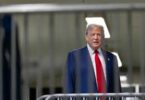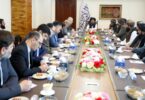Monitoring Desk
Minsk (AFP) Belarusian strongman Alexander Lukashenko is convening hundreds of loyal delegates at a people’s assembly on Thursday to unveil promised reforms, in a display the embattled opposition has dismissed as political theatre.
Europe’s longest-serving leader is expected to roll out proposals to placate demonstrators who flooded streets across the ex-Soviet country last year to protest against his claim to a sixth presidential term following an election in August.
The authoritarian ruler made promises in November to change the constitution to calm the protests just weeks after he was shown at a rally brandishing a Kalashnikov assault rifle and referring to protesters as rats.
But opposition protests have subsided in recent weeks, and in the days leading up to the assembly, Lukashenko made no mention of the promised constitutional changes.
On the eve of the assembly he instead highlighted a state-initiated survey that he said will determine the outcomes of the gathering, which draws around 2,700 hand-picked representatives from mostly state-backed sectors.
“It is very difficult at the All-Belarusian People’s Assembly to plan something without knowing the deep sentiments in society,” Lukashenko was cited by his press service as saying.
The Nexta Telegram channel, which mobilised and coordinated demonstrators over the months of rallies, called for fresh demonstrations on Thursday and Friday when the assembly will be in session.
“This is a gathering of unfortunate Lukashenko supporters who were rounded up for one purpose — to amuse the pride of one person,” Nexta wrote, encouraging residents of Minsk to take to the streets.
Belarus police, however, promised to “suppress” any illegal activities and warned of potential road closures in the capital, officially due to expected heavy snowfall.
– Low expectations –
Both analysts and the opposition have low expectations that any tangible results will come from changes announced at the assembly.
Lukashenko has held constitutional referendums twice before, both times pushing through changes that strengthened the presidency.
In 1996, two years after he became president, he gave himself greater power to appoint judges, including the chair of the Constitutional Court.
A second referendum in 2004 allowed him to serve three terms instead of two.
The All-Belarusian People’s Assembly is typically convened by Lukashenko during his presidential campaigns to give his candidacy a semblance of popular support.
But he opted last year to instead visit police and military units ahead of the vote.
As tens of thousands turned out for rallies in Minsk every weekend through the autumn, reaching up to more than 100,000 at their peak in a country of some 10 million, those security forces were vital in ensuring Lukashenko maintained his grip on power.
In a crackdown that left at least four protesters dead, riot police detained thousands of demonstrators, many of whom reported torture and abuse in custody.
The European Union slapped sanctions on Lukashenko and his allies and EU diplomats met in Minsk on Sunday with the relatives of the Belarusians who died during the protests.
In comments to AFP, the foreign minister of EU-member Lithuania, which has sheltered exiled opposition leader Svetlana Tikhanovskaya and several hundred other activists, dismissed the assembly as an “attempt to imitate dialogue”.
“The ongoing persecution of political opponents by the organisers of the ‘dialogue’ clearly emphasises that this is just a dialogue between Alexander Lukashenko and his supporters,” Gabrielius Landsbergis said.
Courtesy: France 24






